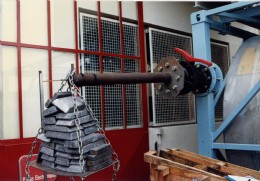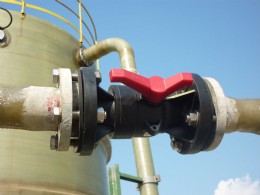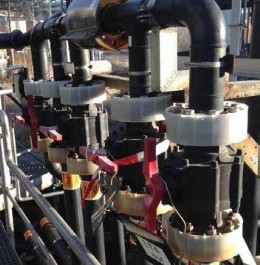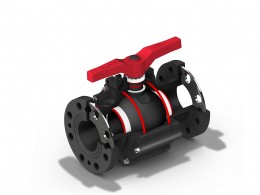Valve Materials: Do you know all of your options?

CORROSION: Weir type PTFE lined diaphragm valve on a Sulphuric Acid duty

STRONG: Switching to a plastic valve does not mean a compromise on strength

Plastic valves are now used in a wide range of applications; metal, plastic or GRP pipework systems

HCL PROCESS: Often lined valves are specified for use on high concentrated acids. GRPP valves offer an effective solution

Over the last 50 years there have been great advances in the materials available for the manufacture of valves. New processes and a greater understanding of the way that materials behave when being formed and machined coupled with advances in computer modelling have led to a whole new range of materials being available to meet the demands of todays’ industrial processes. Processes that require valves to handle higher pressures and temperatures, aggressive service conditions, corrosive mediums, be lighter/stronger and last for many years without maintenance; can all benefit from the use of alternative materials.
Is Metal Always the Right Option?
High performance valves have traditionally been made from various metals and alloys, and in many cases this has been a successful process. There has indeed been a growth in the use of the term ‘fit and forget’. Valves and process equipment which are expected to give longevity and reliability to perform in corrosive environments are often given special surface coatings as a means of superficial protection. While in some cases this is a successful process, there are times when it is not the ideal, and corrosion does occur. The natural passivation layer found on Stainless Steels and similar materials can often be quickly eroded/corroded during process conditions leaving the base metal exposed. The same can be said for valves with special linings (often plastic) as when damaged, the valve can quickly fail and be expensive (time & cost) to repair.
Plastic Valves – a wide range of benefits
During the same period of time SAFI (est. 1963) have also made great advances in their knowledge and development of Thermoplastics and their use in the manufacture of valves. The original materials used for the manufacture of plastic valves did (and still do) have limitations in their use, so new materials have been developed that offer better resistance to corrosion than many of the traditional metals and super alloys. As well as being inert to the corrosive media and environments expected in industrialised process conditions such as Oil & Gas, SAFI developed their products with special additives to protect from harmful Ultra Violet Light, Glass Fibre for improved mechanical strength and dimensional stability as well as resistance to temperatures up to 100deg C.
Furthermore Thermoplastic valves are significantly lighter than their metal counter parts, the opportunity to save weight in a system is usually very welcome indeed! All of these features allow design engineers to give serious consideration to where Thermoplastic valves can be used to complement or replace metal valves and therefore give reliable cost effective solutions to their clients!
Plastic Valves and ATEX Requirements
Several years ago SAFI pioneered the development of Anti-static plastics containing carbon powder & carbon fibre with a surface resistivity of less than 109 ohms a requirement of EN 50014. They manufacture full bore full faced ball valves (DN15-150) which qualify to ATEX zones 1 and 2.
SAFI offer valves manufactured from various Thermoplastics: PVC-U/C, ABS, PPH, GRPP (20% glass fibre), PVDF and Anti-static materials.
Successful use in Industry
Some of the most common applications of thermoplastic valves relating to the oil and gas industry include:
• Electro-chlorination: Hydrochloric Acid, Sodium Hypochlorite, Chlorine; GRPP/UPVC & PVDF
• Water Treatment & Demineralization: Caustic, Sulphuric & Hydrochloric Acid; GRPP & PVDF
• All forms of Chemical Dosing: GRPP, PVC-U/C, PPH, PVDF
• Not forgetting utility type applications for the supply and drain of water & wastewater
DID YOU KNOW?
• DN 150 (6˝) Stainless steel ball valve is on average 5 times heavier than a GRPP ball valve
• DN 150 (6˝) Stainless steel ball valve is on average 3 times more expensive than a GRPP ball valve
• PVDF is 10 times more resistant to abrasion (TABER test) than 304 Stainless steel.
SAFI Ltd
Tel: 01202 624618
Email: sales@safi-valves.com

| Telephone: | 01202 624618 |
| Email: | sales@safi-valves.com |
| Website: | www.safi-valves.com |
| More information on the SAFI Ltd BVAA Member Directory Page |












